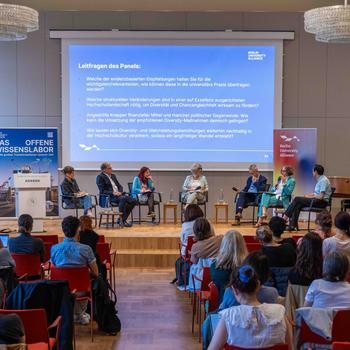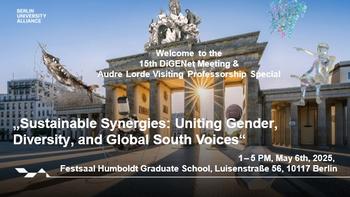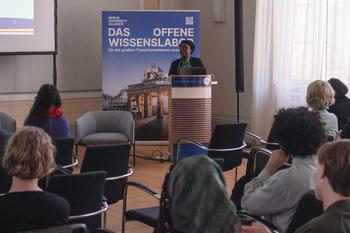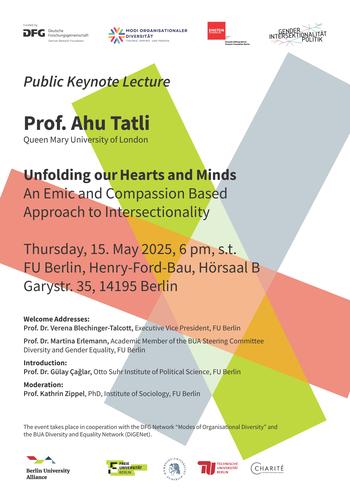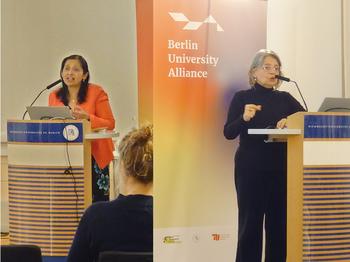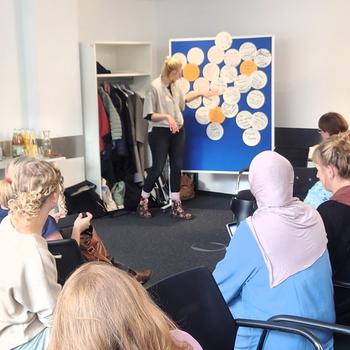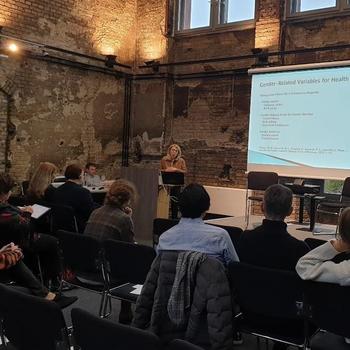DiGENet Events
DiGENet events facilitate interdisciplinary exchange on diversity and gender equality in academia, bringing together researchers, practitioners, and decision-makers to share knowledge, develop strategies, and foster institutional change.
The 16th DiGENet Dialogues, titled “Research. Evidence. Strategy. Shaping Diversity Successfully”, brought together leaders, researchers, and practitioners from across the Berlin University Alliance to discuss how academic institutions can more effectively integrate diversity and equal opportunity into their strategic development. Central to the event were research presentations from the DiGENet Junior Research Groups, whose work spans large-scale surveys on meritocracy and discrimination, institutional responses to harassment, and targeted equity interventions in medicine and STEM. A panel discussion with the presidents of the four BUA institutions engaged directly with the groups’ evidence-based recommendations, sparking dialogue on how structural transformation can be grounded in research. Emphasizing the need to shift the focus from marginalized individuals to systemic change, the event underscored the potential of interdisciplinary, data-driven strategies for sustainable impact.
Related Links
The 15th DiGENet Network Meeting and installation of DiGENet Dialogues, “Sustainable Synergies: Uniting Gender, Diversity, and Global South Voices”, took place on May 6, 2025, in Berlin. The centerpiece was the inaugural lecture of Audre Lorde Visiting Professor 2025 Prof. Angela Dziedzom Akorsu (University of Cape Coast), who examined how gendered labor divisions in Ghana intersect with questions of sustainability and equity. Her talk challenged prevailing assumptions in development discourse and highlighted the value of gender-sensitive approaches in both research and practice. Three Berlin-based projects were then presented, each demonstrating how sustainability, gender, and diversity intertwine in research contexts. The event concluded with a moderated dialogue exploring the UN Sustainable Development Goals through the lens of transregional gender research. The conversation addressed colonial continuities in global labor systems and proposed actionable strategies to counter structural gendered inequalities. The event provided a space for exchange, critical reflection, and networking at the intersection of diversity and global justice.
Related Links
At the 15th DiGENet Dialogues “Sustainable Synergies: Uniting Gender, Diversity, and Global South Voices”, the inaugural lecture of Audre Lorde Visiting Professor Prof. Angela Dziedzom Akorsu (University of Cape Coast) examined how gendered labor divisions in Ghana intersect with questions of sustainability and equity. Her talk challenged prevailing assumptions in development discourse and highlighted the value of gender-sensitive approaches in both research and practice.
Related Links
The joint event “Intersections Matter: Feminist Perspectives on Theory, Research, and Practice in Science” brought together the DFG Network Modes of Organizational Diversity and DiGENet members at Freie Universität Berlin on May 15, 2025. In an interdisciplinary dialogue, participants discussed how intersectional analyses of institutional structures can contribute to the development of evidence-based strategies for transformative change in higher education.
At the DiGENet Lunch Talk on December 2, 2024, Harvard University professors Frank Dobbin and Michèle Lamont (both Harvard University, USA) shared cutting-edge research and critical insights into structural drivers and barriers of diversity and inclusion in academia. Dobbin presented unpublished data from a study across 600 U.S. universities, highlighting effective institutional reforms, while Lamont called for an intersectional rethink of meritocracy and academic gatekeeping.
Related Links
- https://www.berlin-university-alliance.de/commitments/diversity/digenet/Flyer_Lunchtalk-02-12-24.pdf
At the 14th DiGENet Network Event, "DiGENet Dialogue on gender, global health & global south", Prof. Jaya Dantas reflected on her international work with refugee and migrant women, highlighting participatory research in post-conflict regions, including Uganda, Rwanda, and Australia. Her projects—from photovoice studies to community midwifery—emphasize empowerment and health equity tailored to diverse social contexts. Prof. Simone Diniz discussed reproductive justice in Latin America, drawing attention to unequal access to contraception, abortion, and respectful maternal care. She stressed the political nature of health indicators and the need for data that captures structural disparities and power imbalances.
Related Links
The 14th installation Network Meeting was also the launch of a the new "DiGENet Dialogues" format and explored global perspectives on gender, diversity, and reproductive health. Prof. Malek Bajbouj introduced the BUA funded Prodigy project, a culturally sensitive intervention addressing postpartum depression, particularly among migrant women. The initiative emphasizes participatory methods, community engagement, and digital health equity through a patient-and-public-involvement (PPI) approach. Prof. Jaya Dantas, current Audre Lorde visting Professor, reflected on her international work with refugee and migrant women, highlighting participatory research in post-conflict regions, including Uganda, Rwanda, and Australia. Her projects—from photovoice studies to community midwifery—emphasize empowerment and health equity tailored to diverse social contexts. Prof. Simone Diniz, also current Audre Lorde Visiting Professor, discussed reproductive justice in Latin America, drawing attention to unequal access to contraception, abortion, and respectful maternal care. She stressed the political nature of health indicators and the need for data that captures structural disparities and power imbalances. The dialogue closed with reflections on resistance strategies, the politicization of health data, and the impact of diverse research teams. Speakers emphasized that sustainable equity work requires community participation, interdisciplinary collaboration, and active responses to growing global backlash against gender rights.
The "From Inclusion to Belonging" workshop, co-organized by the Berlin University Alliance (BUA) and Berlin Research 50 (BR50) on October 23, 2024, convened in Berlin to deepen the understanding and strategic implementation of Equity, Diversity, Inclusion, and Belonging (EDIB). This high-profile event with key inputs of Prof. Kelly Hannah-Moffat (University of Toronto) brought together 42 academic leaders, strategists, and policy stakeholders to discuss and formulate concrete actions that ensure EDIB becomes a foundation in Berlin's academic ecosystem.
Related Links
The 13th DiGENet Network Meeting on “Gender & Diversity in STEM” addressed structural biases and pathways for integrating gender and diversity perspectives into scientific research, teaching, and institutional development. In her opening, TU President Prof. Dr. Geraldine Rauch emphasized the enduring gender gaps in research - from biased clinical studies to algorithmic discrimination in AI - and called for institutional accountability in tackling these issues. Dr. Sigrid Schmitz (HU Berlin) delivered a keynote on embedding gender into STEM epistemologies, highlighting the persistence of a white, male-dominated scientific framework and advocating for a shift in how “sex” and “gender” are conceptualized in knowledge production. Discussions explored the need for discipline-specific approaches, cross-cutting practices, and community-building within STEM. The meeting showcased the BUA Certificate Program “Gender & Diversity in Science & Technology Studies”, presented by Prof. Dr. Petra Lucht and Prof. Dr. Martina Erlemann (FU Berlin), which supports students and early-career researchers in critically engaging with diversity in STEM contexts. The program aims to expand across BUA partners and welcomes interdisciplinary collaboration. In her talk, Prof. Dr. Martina Schraudner (Fraunhofer CeRRI) emphasized the European framework’s call to integrate gender into research funding, innovation, and societal impact strategies. She underlined the role of co-design, inter- and transdisciplinary collaboration, and the need for professionals trained in gender-sensitive research.
The 12th DiGENet Network Meeting on May 24, 2024, brought together researchers and equality officers to explore strategies for promoting diversity and preventing discrimination in academia. Ulrike Ohnesorge presented the Max Delbrück Center’s comprehensive prevention concept, developed in response to cases of harassment and power abuse, including clear complaint structures and a decentralized network of trained contact points. The Einstein Center Digital Future shared insights from its Gender & Diversity Network, including a Wikipedia “Edit-a-thon” aimed at making knowledge production more inclusive. Our DiGENet junior research groups introduced projects on academic careers, sexual harassment, and multiple marginalization, all pointing to the need for data-driven and structural responses. In her keynote, Prof. Kelly Hannah-Moffat (University of Toronto) illustrated how universities can build lasting equity cultures by combining leadership accountability, community input, and transparent processes. The event underscored the importance of institutional commitment, participatory practices, and long-term strategies to create inclusive academic environments.
The kick-off workshop “Decolonizing the Curriculum” on April 26, 2024, convened scholars and practitioners from the social sciences and humanities to discuss strategies for dismantling Eurocentric structures in teaching and institutional practice. Through critical reflection on canons, classroom dynamics, teacher education, and organizational barriers, the workshop emphasized decolonization as a relational, structural, and pedagogical endeavor—highlighting best practices and calling for institutional commitment, redistribution, and inclusive reform within the Berlin University Alliance.
The 11th DiGENet Network Meeting convened stakeholders from across the Berlin University Alliance to deepen the dialogue on structural diversity and anti-discrimination in research and institutional practice. In her keynote, Prof. Dr. Zerrin Salikutluk presented insights from the National Discrimination and Racism Report (NaDiRa) - highlighting subtle discrimination, healthcare inequalities, and intersectional burdens faced by marginalized groups. Her call for targeted, inclusive action shaped a critical discussion on data-informed policy and research. The meeting spotlighted current institutional efforts, including the Freie Universität Berlin’s Diversity Strategy (Dr. Rebecca Mak), which emphasized inclusive structures, complaint mechanisms, and the legal framework for anti-discrimination. Further input came from Dr. Georg Toepfer, who
introduced the DiGENet Diversity Glossary (in German language only) as a scholarly and pedagogical tool to support critical engagement with diversity-related terminology. Workshops and breakout sessions encouraged participants to collaboratively design strategies for inclusive research cultures - addressing decolonization in curricula, mentoring, data collection, and resilient frameworks for equity in science. Closing remarks by Prof. Dr. Gertraud Stadler reaffirmed DiGENet’s commitment to interdisciplinary exchange and announced continued focus areas such as STEM-related diversity initiatives.
The 10th DiGENet Network Meeting created a platform for exchange between academic and administrative stakeholders of the Berlin University Alliance with the aim of discussing intersectional strategies in the areas of diversity, gender equality, and institutional change. In her keynote speech, Prof. Londa Schiebinger (Stanford University) emphasized the “Gendered Innovations” approach and pointed out the need to systematically integrate sex, gender, and intersectionality into STEM research (MMINT). She called for three essential changes: correcting the numbers, correcting the institutions, and correcting the knowledge. The program also included presentations on the diversity strategies of the Technical University of Berlin and Humboldt University of Berlin. These presentations highlighted structural advances such as the establishment of counseling and complaint offices, intersectional guidelines, and expanded mentoring for underrepresented groups. In small group discussions, institutional strategies for combating social and structural inequality were further developed.
The keynote by Prof. Londa Schiebinger (Stanford University) at the 10th DiGENet Networking Event highlighted the “Gendered Innovations” approach and the need to systematically integrate sex, gender, and inter-sectionality into STEM research (MMINT), advocating for three key changes: fix the numbers, fix the institutions, fix the knowledge.
This lecture series was dedicated to this tension and how a diversification in higher education institutions can be possible and which questions must be confronted. The lecture series was hosted by the Diversity and Gender Equality Network of the Berlin University Alliance's Cross-Cutting-Themes Diversity und Gender Equality. We are proud that six internationally renowned experts accepted our invitation to deliver a lecture in our series. The lectures critically examined the tension between diversity and excellence from different (inter-)disciplinary perspectives.
Related Links
The 9th DiGENet Network Meeting focused on the tensions between institutional diversity discourse and the lived realities of exclusion, structural violence, and epistemic marginalization in academia. In a powerful keynote, Prof. Zintombizethu Matebeni (University of Fort Hare, South Africa) unpacked the concept of “nothingness” as a site of both exclusion and radical potential, critiquing the symbolic nature of inclusion policies at historically white institutions. Her personal experiences of systemic neglect, institutional racism, and the burden placed on Black queer scholars prompted urgent reflection among participants on the cost of diversity work, especially in internationalization contexts. A key takeaway: “fixing the institution, not the excluded” must become the guiding principle of future strategies. In the second portion of the event, the DiGENet’s Junior Research Groups presented empirical projects tackling academic inequality. Dr. Aline Oloff (TU Berlin) called for collaborative, data-informed diversity policies rooted in institutional accountability, not individualized responsibility, while Prof. Dr. Mirjam Fischer (HU/Frankfurt) addressed multiple barriers to academic excellence. Dr. Pichit Buspavanich (Charité) introduced interventions for improving supervisory relations in medical research contexts. A best-practice panel showcased diversity strategies at NeuroCure, SCRIPTS, and Charité, emphasizing structural and cultural transformation across the Alliance.
The 8th DiGENet Network Meeting, held at Humboldt-Universität zu Berlin, centered on the intersection of diversity and university teaching. It brought together academics, students, and equality stakeholders to share institutional practices and strategize across institutions. A major highlight was the presentation of the “Toolbox Gender and Diversity in Teaching”, a long-standing project by the Margherita-von-Brentano Center and the Central Women’s Representative team. The Toolbox offers curated resources, blog articles, and interactive workshops that support educators in integrating anti-discrimination and diversity-conscious pedagogy into their teaching. It emphasizes structural change through inclusive didactics, diverse representation, and accessible seminar design. The event also showcased formats like the "Student Research Opportunities Program X", linking student research and diversity-sensitive learning, and underpinning the aim of DiGENet to act as a collaborative driver of change within and beyond the Berlin University Alliance.
The seventh meeting of the Diversity and Gender Equality Network focused on intersections between diversity, internationalization, and structural reform across Berlin’s academic landscape. Hosted by the Steering Committee for Diversity and Gender Equality of the Berlin University Alliance, the event included institutional updates, a keynote presentation on teacher education reform by Prof. Maisha Auma (Audre Lorde Visiting Professor), and working sessions on tensions between diversity and internationalization. Auma presented a joint DiGENet statement calling for the systematic integration of diversity and intersectionality into Berlin’s teacher training programs, responding to current policy reforms and the city’s diverse school environments. Additional contributions addressed Green Open Access strategies and the Berlin University Alliance’s Internationalization Agenda, including partnerships with institutions in the Global South. In workshops, participants critically discussed structural inequalities within internationalization efforts, emphasizing ethical publishing, inclusive administrative practices, and the need for better diversity metrics. Proposals included cross-sectoral collaborations, diversity training certifications, and expanding guest lectureships. The meeting reinforced DiGENet’s role as a bridge between institutional transformation and inclusive academic practices.
The sixth DiGENet Network Meeting, hosted jointly with the Berlin University Alliance’s Steering Committee for Knowledge Exchange (SC2), focused on forging stronger links between diversity research and external knowledge-sharing initiatives. The session featured updates from DiGENet Working Groups—on critical diversity perspectives, terminology, and the Diversity Minimal Item Set—as well as insights into ongoing and planned collaborations across disciplines and institutions. SC2 introduced its strategy for multidirectional knowledge exchange, including modular funding, science communication labs, and transdisciplinary research forums on global health and social cohesion. Four breakout groups explored future formats to enhance structural change, with proposals ranging from diversity-focused public lecture series and artist-academic collaborations to decolonial teaching modules, inclusive school outreach, and podcasts amplifying marginalized perspectives. A recurring theme was the need to move from symbolic inclusion to institutional transformation—especially in teacher education, policymaking, and transdisciplinary partnerships that center diverse forms of knowledge.
In the lecture series “Intersectional Diversity Studies. Critical Diversity and Gender Studies in the 21st Century", launched in the winter term of 2021/22, Maisha M. Auma, current Audre Lorde visiting professor, critically examined diversity, inclusion, and intersectionality in research institutions from a transnational perspective. In addition, she offered a Lab Meeting/Colloquium, which assessed how marginalized groups with little social power participate in the decolonization of white and Western-centered knowledge structures, and how skills in critical diversity enable new didactic framework conditions for teaching at university and high school levels. The event was organized in cooperation with the Berlin Center for Global Engagement (BCGE).
Related Links
Maisha M. Auma offered a Lab Meeting/Colloquium in block format from November 10, 2021, which took place online. In cooperation with the DiGENet Working Group on Critical Perspectives, the Center for Inclusion Research at Humboldt-Universität zu Berlin, and the Federal Conference of Women's and Equal Opportunity Commissioners at Universities e.V. , the internal and public workshops focused on three topics: a critical examination of the term diversity, a critical examination and mapping of diversity surveys as well as surveys that have been conducted to analyze experiences of discrimination at German polytechnics and universities, and diversity and teacher's trainings in the Berlin area, in cooperation with DiGENet's Subject Didactics Network. The four public sessions were convened to discuss and further develop the work process, including goals and preliminary findings, together with the interested (expert) public. The Lab Meeting/Colloquium was open to master's degree students with advanced knowledge of gender and diversity studies.
Related Links
The fifth meeting of the Diversity and Gender Equality Network brought together researchers across Berlin’s academic landscape to strengthen diversity-related collaboration within three disciplinary clusters: Humanities, Social Sciences, and Health & STEM. Discussions addressed structural gaps in data, academic participation, and the framing of excellence, with emphasis on making diversity measurable and visible through new instruments such as the Diversity Minimal Item Set and an evolving Diversity Glossary. The event highlighted the need for intersectional, decolonial, and anti-racist approaches in research and teaching, with working groups proposing practical tools like a diversity monitoring survey, a seed fund for pilot projects, and a multilingual e-learning platform. Participants called for institutional transformation in both academic culture and administration, pointing to the exclusionary norms embedded in research evaluation, hiring, and disciplinary boundaries. The event also showcased DiGENet’s expanding role in shaping structural change through initiatives such as the Audre Lorde Visiting Professorship and International Lecture Series.
DiGENet's fourth Network Meeting centered on advancing intersectional research and strengthening collaboration across Berlin’s academic institutions. The event featured an inspiring keynote by Prof. Maisha Auma, the inaugural Audre Lorde Visiting Professor, who outlined the legacy of Audre Lorde and emphasized the need for subaltern and power-critical approaches to diversity studies. Participants then engaged in working groups on key diversity dimensions (Gender & LGBTQ, Racism & Migration, Health & Ability, Socioeconomic Status & Regionality), identifying opportunities for cross-cutting advocacy and practical integration into broader DiGENet structures. Several established working groups reported updates, notably on the Minimal Item Set for diversity measurement, which included new items on caregiving and discrimination. Concerns were raised about bureaucratic barriers to diversity monitoring and the risk of narrowing diversity studies to quantitative metrics. As the outgoing coordination team handed over leadership, the meeting set the stage for deeper structural engagement, reinforcing DiGENet's role as both a research network and a driver of systemic change.
At its third Network Meeting, the Diversity and Gender Equality Network explored how to integrate intersectional diversity dimensions more systematically into academic structures and collaborative research. Participants engaged in “Matrix Working Groups” on topics such as Gender & LGBTQ, Racism & Migration, Ability & Health, and Socioeconomic Status & Regionality, emphasizing the need for intersectional approaches, stronger links between research and community practice, and more inclusive metrics for evaluating structural inequities. The established DiGENet Working Groups reported on their progress: developing a Minimal Item Set for diversity monitoring, launching a Diversity Glossary, advancing gender- and diversity-sensitive teaching, and critically analyzing the politics of diversity through reflective and decolonial lenses. A key message across groups was the necessity of shifting from symbolic gestures to institutional and systemic change. This event also marked the transition to a new coordination team, reinforcing DiGENet’s commitment to continuity, participation, and structural impact across Berlin’s academic landscape.
At its second virtual meeting on January 19, 2021, participants emphasized that achieving genuine excellence in Berlin’s research landscape - including its alignment with the UN Sustainable Development Goals (notably social cohesion and global health) - depends on embedding diversity across researchers, research questions, and institutions. Multidisciplinary and cognitively diverse teams are essential to solving grand societal challenges. The event featured reflections by Prof. Sabine Hark and input from Christina Hadulla‑Kuhlmann (from the Federal Ministry of Education & Research), who highlighted ongoing gender imbalances in academic career advancement and the value of diversity beyond gender - distinguishing between having a seat (diversity), a voice (inclusion), and being heard (belonging). DiGENet aims to form working groups, advance inclusive research methodologies, promote diversity‑sensitive teaching, and integrate network activities across all of Berlin’s research landscape - not just among the four university alliance partners.
Related Links
The launch of DiGENet marked the beginning of a long-term, interdisciplinary collaboration between over 100 Berlin-based researchers and practitioners across disciplines and institutions. As part of the Berlin University Alliance, DiGENet seeks to strengthen diversity and gender equity in research, teaching, and institutional structures through evidence-based strategies and inclusive practices. The inaugural event featured keynote contributions, a participant survey, and ten working groups that explored core challenges such as intersectionality, inclusive methodologies, structural inequalities, and knowledge transfer to civil society. Participants called for institutional change, stronger integration of marginalized perspectives, participatory research, and critical engagement with diversity concepts. A series of follow-up working groups were initiated to translate insights into action - focusing on measures like diversity-sensitive teaching, data tools, terminology work, and structural reform.

